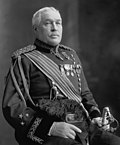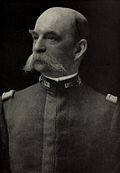Top Qs
Timeline
Chat
Perspective
Commandant of the Army War College
Senior U.S. Army officer commanding the United States Army War College From Wikipedia, the free encyclopedia
Remove ads
The commandant of the Army War College is the senior United States Army officer commanding the United States Army War College. As a direct reporting unit of the United States Army, the commandant is responsible to the Secretary of the Army and Chief of Staff of the United States Army for the successful running of the Army War College. Since 1986, the commandant's official residence is Quarters 1 in Carlisle Barracks.[1][2]


The position dates from 27 November 1901, when General Order 155 established a War College Board to advise the President of the United States and the direct the "intellectual exercise" of the Army. Major General Samuel B.M. Young was appointed president of the Board, thus making him the first President of the Army War College, despite the college only beginning operations under his successor, Brigadier General Tasker H. Bliss.[3] The position was retitled as Commandant of the Army War College with the appointment of Major General James W. McAndrew to the presidency in 1919.[4] Five commandants later became superintendent of the United States Military Academy.
The commandantship was vacant for two separate periods, both during wartime when classes were suspended: from August 1918 to June 1919 (during World War I) and from July 1940 to January 1950 (during World War II and the early postwar era).[4]
The commandant, since 1986, has consistently held the rank of major general.
Remove ads
Commandants
Summarize
Perspective
List of commandants in chronological order[4]
Remove ads
See also
Notes
- Repeat terms are to be bracketed with the same number. This is not an official numbering.
- Highest rank held by the officeholder while serving as Commandant.
- Achievements of the officeholder while serving as Commandant; notable military or political positions held post-commandantship, in particular leadership of other military institutions such as the U.S. Military Academy or U.S. Army Command and General Staff College.
References
Wikiwand - on
Seamless Wikipedia browsing. On steroids.
Remove ads


















































